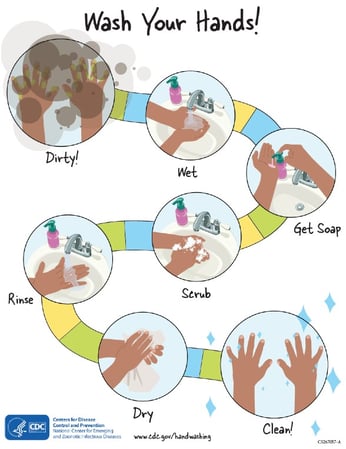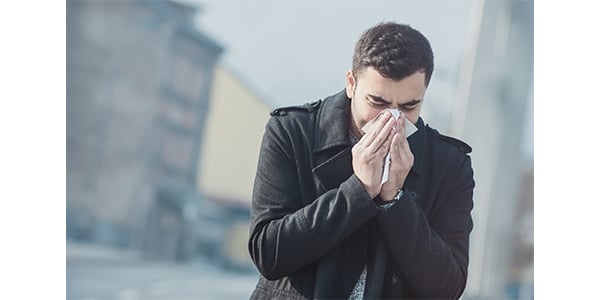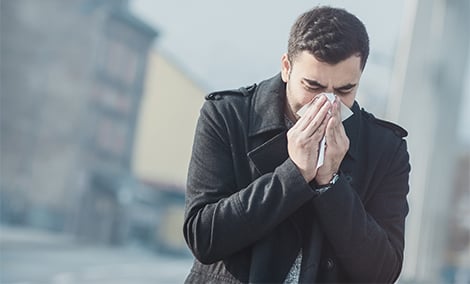By: Laura Bollinger, RDN
Sore throats, runny noses, colds, and flu are a sure sign winter has settled in for the season. The Centers for Disease Control and Prevention (CDC) estimates that on average adults come down with two to three colds per year.
The good news is that most of us will recover in about 7-10 days. The bad news is it will take about 7-10 days to recover!
Who has time to be sick? We all have things to do, places to be, or deadlines to meet. Taking that long to rest and recover doesn’t usually fit conveniently into our schedules.
Fortunately, there are steps we can take to prevent winter illnesses.
According to the CDC, there are three key ways we can reduce our risk of catching a cold. First and foremost, wash our hands! Germs spread as we go throughout our day from our phones, to keyboards, to handshakes. So the best way to stop germs in their tracks is frequent handwashing. If your schedule limits access to a sink regularly, regularly use a hand sanitizer that contains alcohol.

Next, avoid touching your eyes, nose, or mouth with unwashed hands. Cold causing germs can enter the body this way, increasing the risk of illness.
Lastly, avoid contact with people who are sick.
WebMD offers more ideas to prevent colds:
- Use a tissue to cover a cough or sneeze instead of your hands
- Regularly participate in aerobic activity
- Eat phytochemical-rich foods including dark green, red, and yellow vegetables and fruits
- Don’t smoke
- Reduce or eliminate alcohol intake
- Relax
If you do become ill this winter, protect others and stay home or at least minimize close contact with others. Use a tissue to cover your mouth and nose when you need to sneeze and try to move away from others before doing so. Wash your hands often and disinfect surfaces you touch to reduce the spread of germs.
The best cold medicine is lots of rest and fluids. While over the counter (OTC) medications may reduce cold symptoms, they don’t cure a cold or make you better any faster.
While many colds will resolve with appropriate rest, some circumstances are best treated by a doctor. If your symptoms are particularly severe or unusual, last for more than 10 days, or if the sick individual is younger than three months old and has a fever or is lethargic, the CDC recommends calling a doctor.
Not all winter illnesses are colds or the flu. Do you know the single largest infectious cause of death in children worldwide, according to the World Health Organization?
I’ll give you a hint: it can be caused by viruses, bacteria, or fungi. Any guesses?
You may be surprised to learn it is pneumonia.

Pneumonia causes inflammation in one or both lungs. The air sacs of the lungs may also fill with fluid, making it difficult to breathe and causing phlegm-producing coughs. It can be caused by a variety of germs but most commonly it is caused by bacteria or viruses in the air we breathe. Most often the body stops these germs from infecting our lungs.
Those areas with the highest risk are low- and middle-income countries, though it can occur anywhere. While children are particularly susceptible to catching pneumonia, the elderly (those over age 65) are also a vulnerable population. Among the elderly, pneumonia is the single most common cause of death from an infectious disease.
Thankfully, pneumonia can be prevented with immunization, sufficient nutrition, and by correcting environmental risk factors. Just like with the common cold, a primary way we can prevent pneumonia is through regular and thorough hand washing.
Additionally, keeping our immune systems strong and healthy through nutritious eating, regular exercise, and adequate sleep helps prevent pneumonia. Keep the lungs’ natural defenses strong by not smoking and avoiding second-hand smoke.
No matter your age, pneumonia should be taken seriously. If you think someone in your family has pneumonia, seek medical attention quickly and do not wait for the infection to progress.
If you’d like to get involved with preventing and treating pneumonia worldwide, you can do so without even leaving your home! Stop Pneumonia offers a variety of resources to help advocates organize an educational event, spread the word on social media, or write letters to government leaders.
Use these tips to keep yourself and your family healthy this winter and enjoy happy, healthy holid





